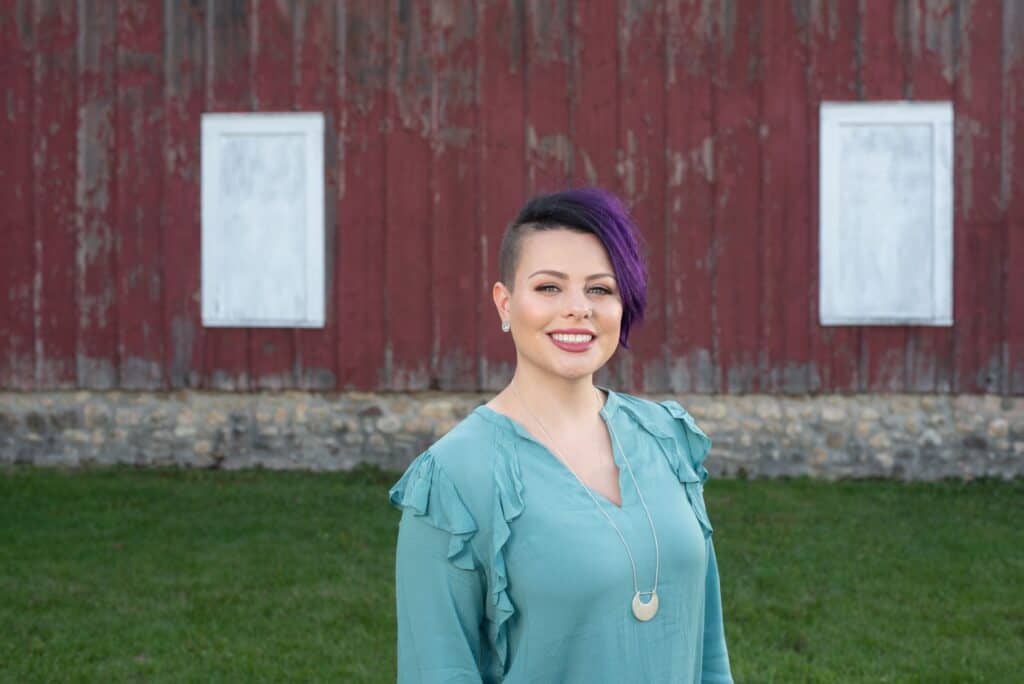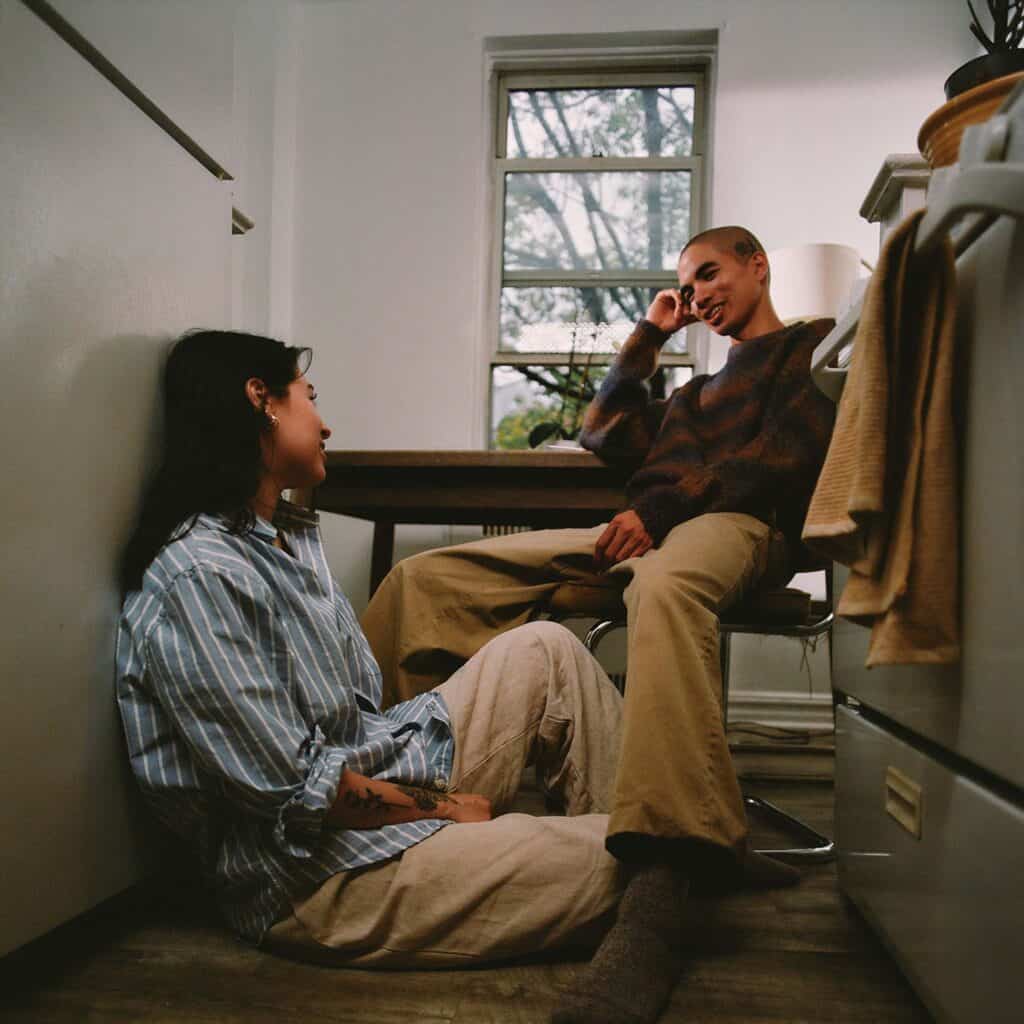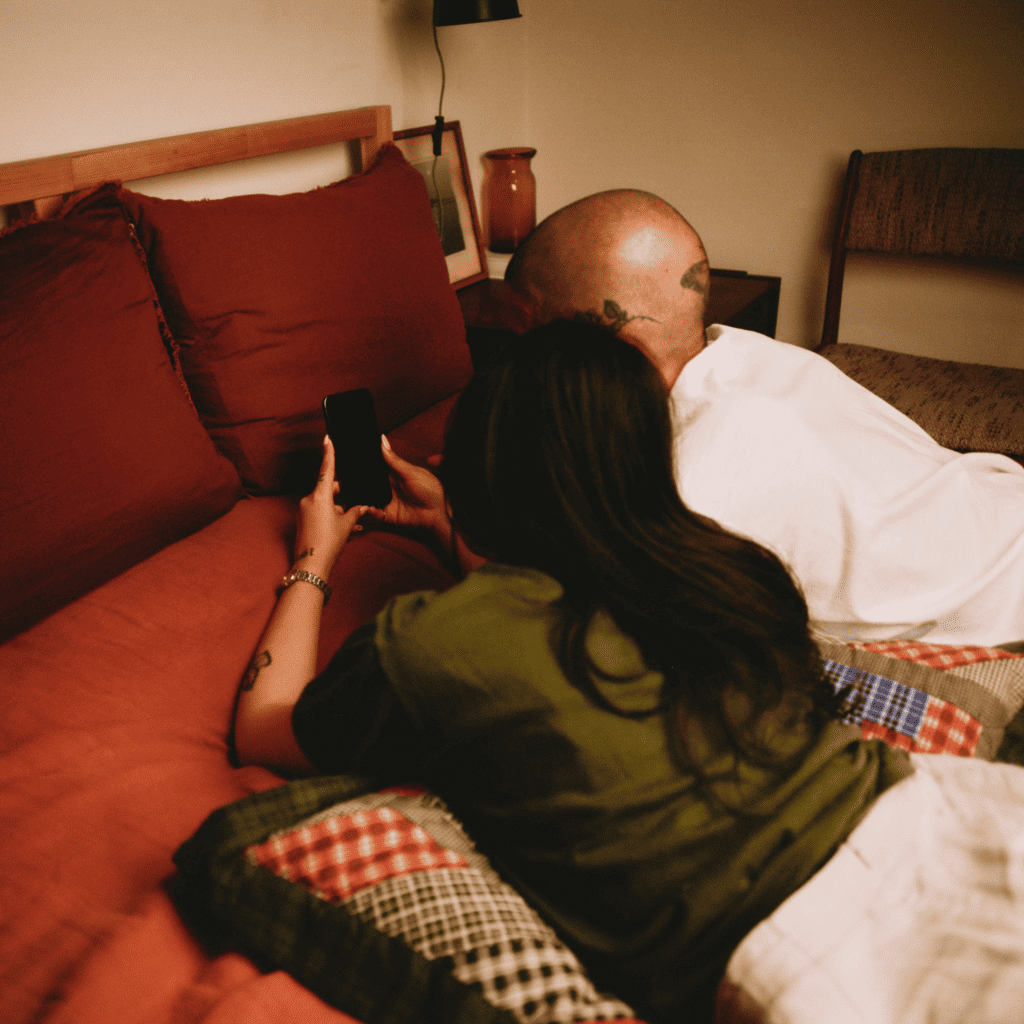Relationship wellness
EFT couples therapy: What is it, and how does it work?

contents
Emotionally focused therapy (EFT) is one of the most effective forms of couples therapy. It works because it helps couples improve their communication while also working with each other’s attachment styles.
All couples eventually have disagreements, and EFT couples therapy is a great way to help couples work through conflict. A 2019 study wanted to find the primary reasons for conflict in relationships, and it was one of the first of its kind. In this study, they found that the top reasons for disagreements included:
- Not showing enough love or affection
- Lack of communication
- One partner not paying enough attention to the other
- Not being appreciated
While there are many sources of these conflicts within relationships, they often result from differing attachment styles and how couples communicate.
Emotionally focused therapy is one of the most popular and well-researched types of couples therapy the most research as well. Using EFT, a couples counselor can help each person recognize negative patterns of thinking and behavior that are leading to conflict. Together, the couple learns how to form a secure attachment bond and respond to each other in healthier ways.
What is EFT?
EFT is a form of therapy that focuses on improving attachments and bonds within relationships. Therapists may use this method in individual sessions to help individuals work on their relationships with others and in couples therapy to help couples work on their relationships.
EFT interventions are rooted in attachment theory, which is the theory that we’re born with a need to form an emotional bond with our caregiver during infancy. The four primary attachment styles are:
- Secure attachment: People who form a secure bond during infancy. These people often have long-lasting, healthy relationships.
- Anxious attachment: When a caregiver is inconsistent with meeting an infant’s needs, the infant can form an anxious attachment style. As adults, these people can seem “clingy” as they’re anxious that their partner will abandon them.
- Avoidant attachment: Caregivers who don’t fulfill an infant’s emotional needs may result in the development of an avoidant attachment style. Those who have this style of attachment are more self-reliant and “closed off” from emotionally connecting with their partner.
- Disorganized attachment: Children who experience trauma and live in fear can develop a disorganized attachment style. When in relationships as adults, they may push others away out of fear of being hurt.
An EFT practitioner helps you identify your attachment style and learn how to recognize the patterns resulting from your attachment style that harm your relationships. From here, they can provide you with tools to work through these challenges and have healthier relationships.
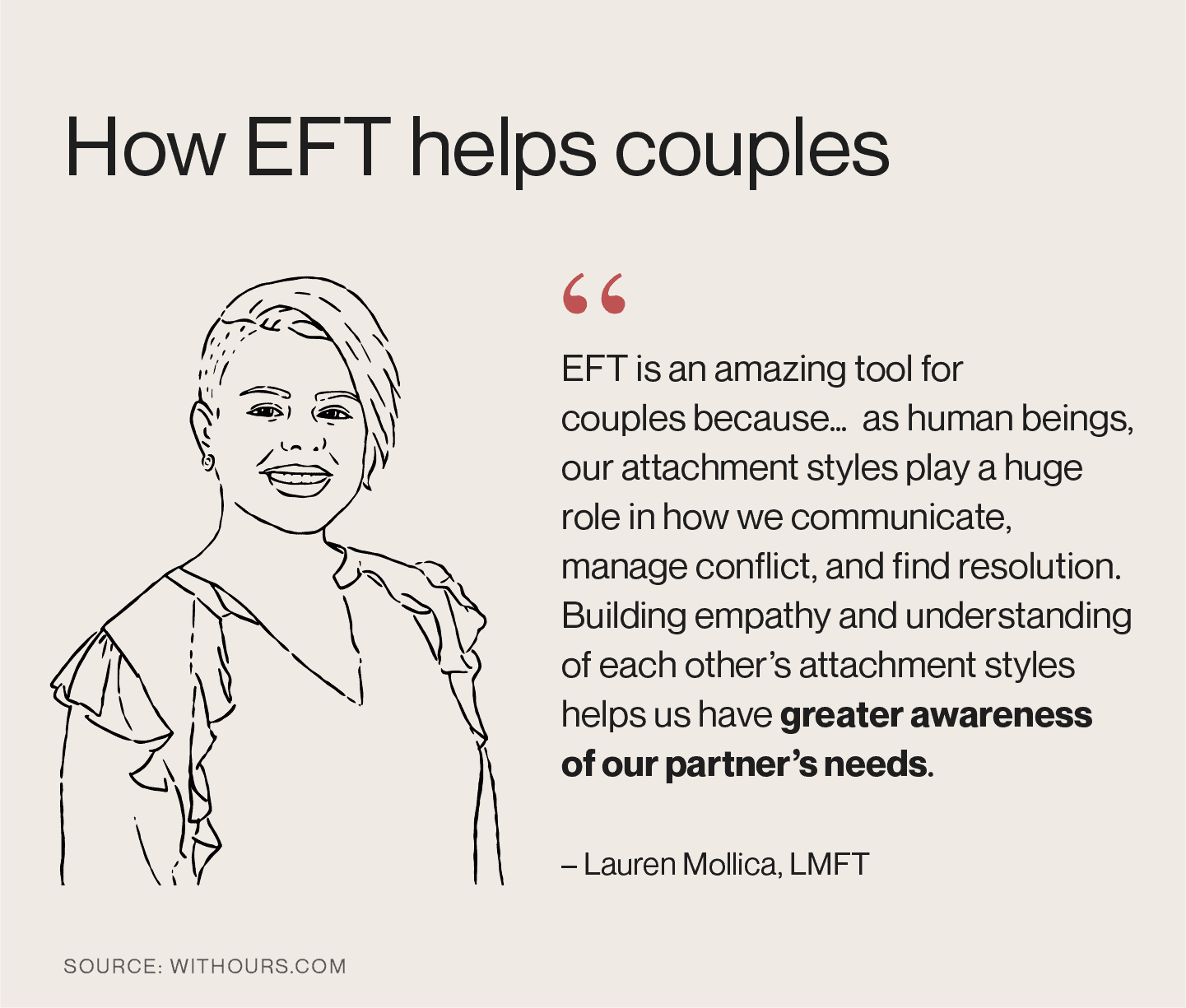
What is EFT couples therapy?
EFT therapy for couples is a short-term form of therapy that typically lasts eight to 20 sessions. Many studies have been conducted to check its efficacy for couples, and a meta-analysis from 2022 looked over the research and found positive results.
The meta-analysis looked at 20 studies involving 332 couples and found that EFT is an “evidence-based couple therapy approach, where 70% of couples will be symptom- free at the end of treatment and greater therapist fidelity to the model is associated with stronger couple gains.”
It aims to help couples strengthen their relationships through communication and conflict resolution by learning to manage their attachment styles.
Sometimes, the past can negatively affect your current relationships. People may feel as though they can’t have healthy relationships due to their past, but EFT can help.
How does EFT couples therapy work?
Emotionally focused therapy works by teaching each partner about their attachment styles and providing them with the tools to work through conflict.
Both partners in a relationship may have different attachment styles, causing them to struggle with communication. It’s also possible that both people share an attachment style that causes turbulence in the relationship. For example, if both people have disorganized attachment styles, they may push each other away rather than working together to resolve their issues.
Fortunately, EFT also addresses a couple’s “relationship fight cycle,” which can often keep couples in conflict. Without knowing about or understanding this cycle, it’s hard to get out of negative patterns.
The relationship fight cycle
Based on your attachment styles, you and your partner may find yourself getting stuck in what’s known as the “fight cycle.” This is a pattern of behavior that can happen with one or both partners and due to not having the proper tools, it can make a couple grow apart. Before diving into EFT couples therapy, it’s helpful to understand the fight cycle.
To illustrate the fight cycle, here’s a hypothetical scenario: Your partner was in a hurry in the morning and forgot to say goodbye before leaving for work.
In this scenario, here’s how the fight cycle would look:
- Unmet attachment need: You long to feel important, and then forgetting to say goodbye may trigger the cycle.
- Primary emotion: This can make you feel invisible, unimportant, and alone.
- Secondary emotion: After the initial feelings of sadness and fear, you may then feel angry.
- Behavior: Finally, you respond with a behavior. This behavior may be to send an angry text message or to start a fight when your partner gets home from work.
Couples run into issues because both partners have their own fight cycle based on their attachment style and how they respond to situations. For example, the partner who forgot to say goodbye may have an avoidant attachment style, which leads them to be closed off when an argument starts.
This can look different for every couple, but due to the lack of the tools necessary to resolve conflicts, the cycle repeats itself. This is when EFT techniques can help.
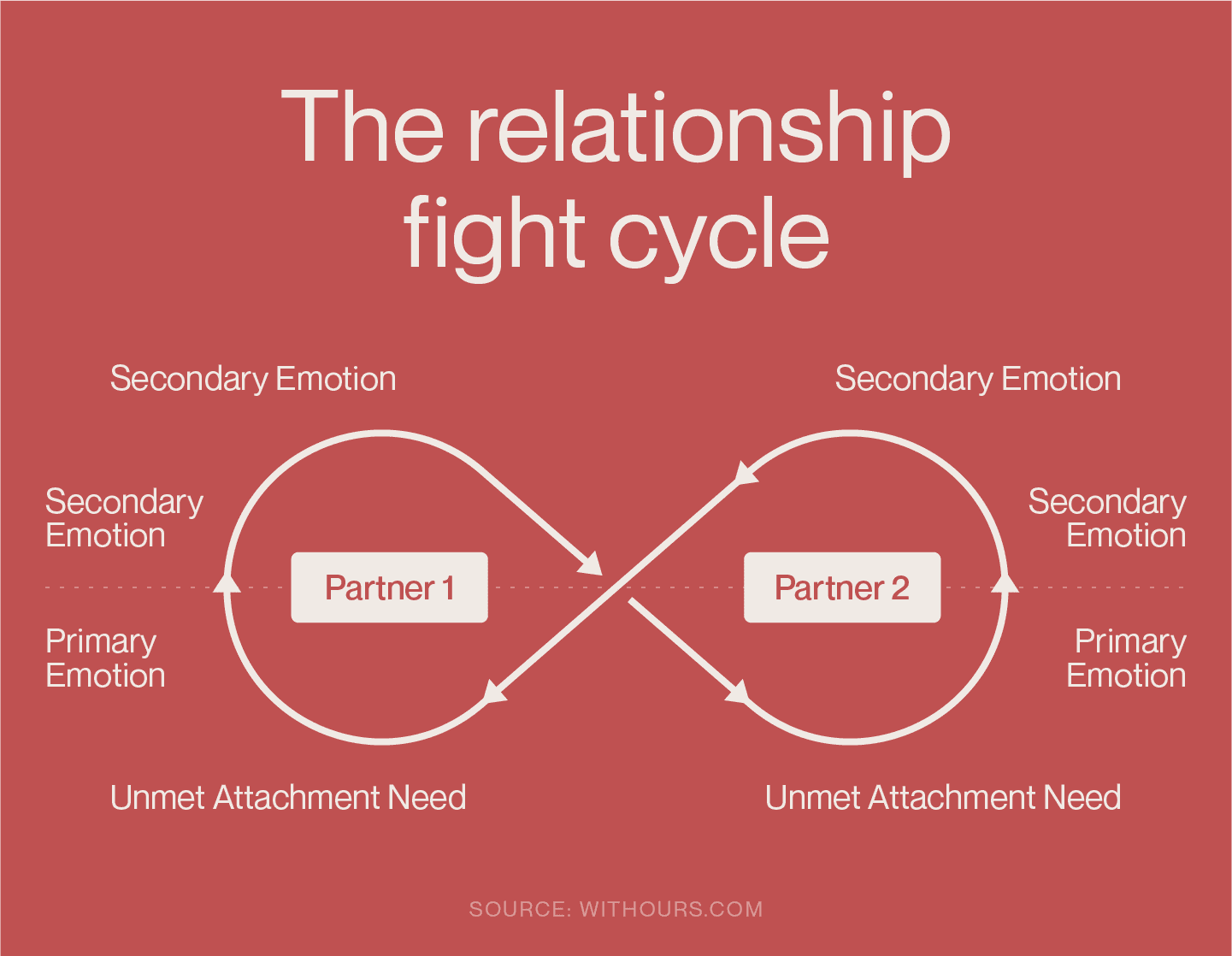
Emotionally focused couples therapy techniques
When working with a therapist, you’ll go through three stages, learning how to improve your communication and conflict resolution. Within each stage of the process, you will gain tools, which will involve some self-reflection, communication exercises, and other techniques.
De-escalation
The first state in the EFT couples therapy process is to recognize the negative patterns that lead and contribute to the conflict. Each partner learns to identify the negative emotions that are triggered based on their attachment style. Oftentimes, the negative emotions arise and the pattern begins due to how a person perceives the situation.
Going back to the previous example, the partner who felt unimportant may have perceived the act as intentional, but the reality was that their partner was in a hurry, and it slipped their mind.
From here, the couple learns how to be more empathetic while also being emotionally available. This makes it much easier to engage in a dialogue with each other and create a safe place to communicate.
“When learning to de-escalate during conflict, many times couples utilize something called ‘parts work.’ This is beneficial because [we often] have many secondary feelings that aren’t brought to the surface when in conflict. For example, a person may say, ‘There’s a part of me that is so angry at you right now because you won’t help with chores, and it feels like I have to do everything. There’s also a small part of me that is sad that you don’t notice that I’m struggling and don’t offer to take things off my plate so we can spend time together.’”
-Lauren Mollica, LMFT
Restructuring
Next is the restructuring stage, in which the couple can begin to communicate to better understand their attachment needs. An EFT therapist helps each partner communicate their wants and needs as individuals. This helps each individual better understand themselves while also telling their partner.
During this stage, it’s important to practice compassion and acceptance. This may take some time, but a couples therapist helps guide you through it.
As an example, one partner may want to bring back physical intimacy to the relationship, but rather than communicating it, it begins the fight cycle. Sex can be a tricky subject for some people, but EFT will help you communicate your wants and needs while also learning to listen to your partner.
Through the EFT process, each partner will learn more about the other’s thoughts and emotions. This helps build a deeper connection and stronger bond while also increasing your understanding of your partner.
Consolidation
The goal in this stage is to practice skills that will help you replace old patterns with new, healthier ones. As you learned about the fight cycle, negative behaviors often come after the initial emotions. Negative behaviors keep the fight cycle going, but a couples counselor will provide you with new tools to resolve the conflict.
The couple takes these new tools and practices them at home in between sessions. By consolidating everything you and your partner learn together, you will begin to see growth. Not only will these tools allow you to resolve conflicts on your own, but recognizing your thoughts and emotions may help you avoid conflicts as you re-evaluate your perceptions of situations.
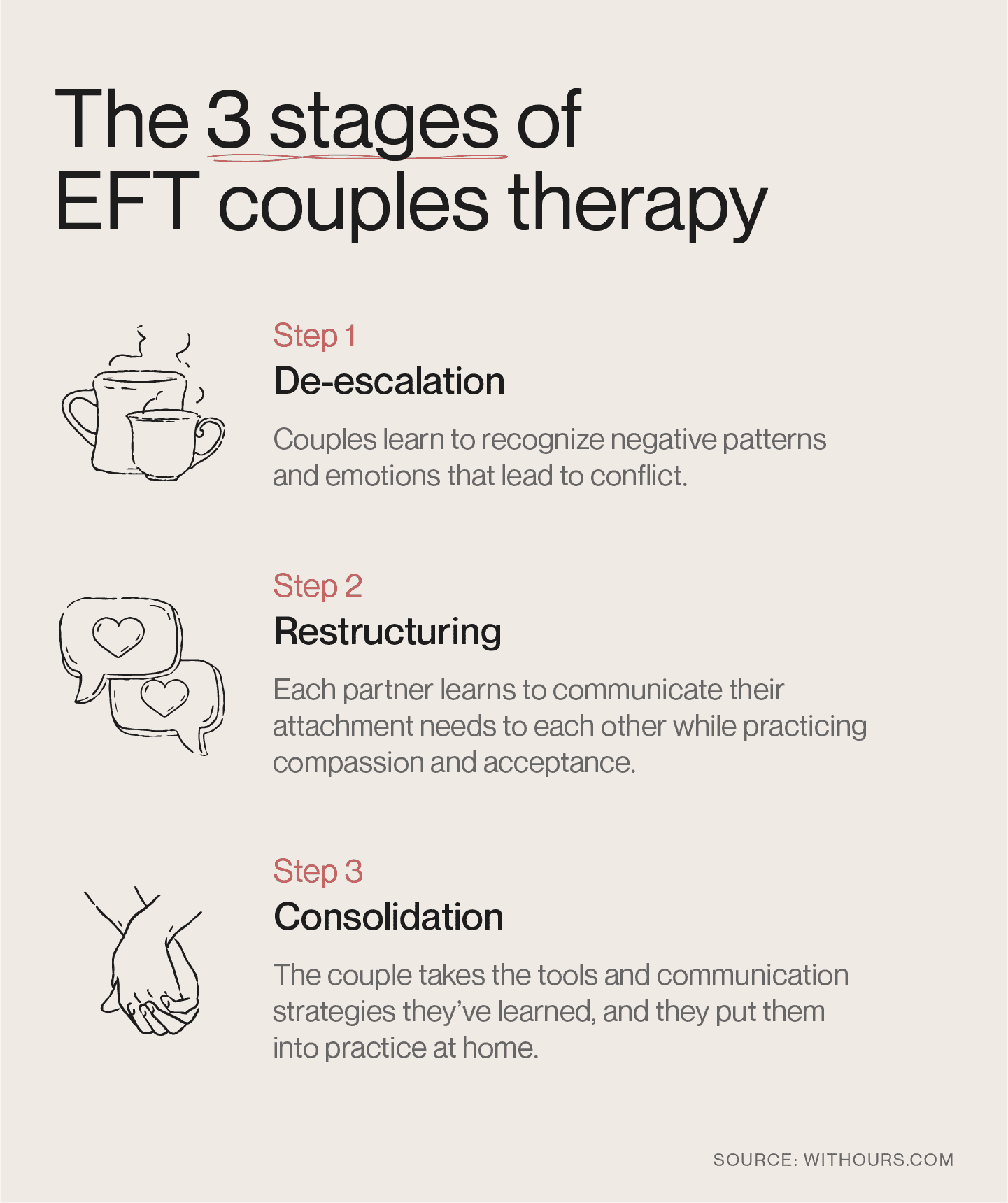
What are the benefits of EFT couples therapy?
Many couples benefit from pre-marriage counseling because individuals often don’t have the tools to navigate the ups and downs of a relationship. Unfortunately, some people didn’t grow up in a household where they could observe or learn healthy relationship behaviors.
A lack of role models for a healthy relationship combined with a negative attachment style can affect how you respond to emotions and situations in your current relationship. EFT couples therapy teaches both partners to replace negative patterns with healthy ones and resolve conflicts in a better way.
“Oftentimes, our partners cannot help the environment they were raised in. It fosters a sense of hope that with EFT, you can learn practical skills to create feelings of safety and secure attachment in your relationship.”
-Lauren Mollica, LMFT
What to expect from EFT couples therapy
During your sessions with an EFT practitioner, the therapist observes how you and your partner communicate. The therapist collaborates with you to help you spot certain patterns and provide you with new ways of interacting. With EFT, rather than just listening, the therapist takes a more active role by helping to guide the conversations.
Many people have difficulty identifying their emotions and the secondary emotions that sit below the surface. The therapist helps each partner identify what they’re truly feeling and where it comes from. They may also give you couples therapy worksheets and other homework to do in between your sessions.
How an EFT therapist can help your marriage
In a relationship, spotting your negative patterns and offering your partner grace can sometimes be difficult. This is why a couples therapist is such a valuable resource. If you think that you would benefit from EFT couples therapy, allow a licensed therapist from Ours to help.
Unlike other therapy services, Ours specializes in couples therapy, and we offer pre-marital counseling as well. Once you fill out a questionnaire, we hand-match you with the right therapists. Not only do we have therapists who specialize in EFT, but many use the Gottman Method, and other treatments that are highly effective for couples. To get started, sign up and fill out the relationship questionnaire today.


